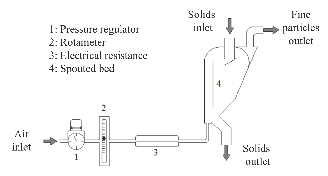Revista Mexicana de Ingeniería Química, Vol. 18, No. 2 (2019), Alim195
Empirical model of the chlorogenic acid degradation kinetics during coffee roasting in a spouted bed
|
P. Ruiz-Palomino, G. Guatemala-Morales, P.M. Mondragón-Cortéz, E.A. Zúñiga-González, R.I. Corona-González, E. Arriola-Guevara
https://doi.org/10.24275/rmiq/Alim195
Abstract
 |
|
Chlorogenic acid (5-O-caffeoylquinic acid or 5-CQA) is a biological active compound found at high concentrations in green coffee that degrades during the roasting process. In the present study coffee was roasted at three air temperatures (425, 450 and 475°C) and seven different times in an innovative spouted bed system. Bean temperature was measured at the exit of the system and 5-CQA was quantified by HPLC. In order to describe the changes in concentration during the roasting process, as a function of bean temperature, an Arrhenius type kinetic model was proposed. Bean temperature was fitted to a one linear and two exponential terms equation, as a function of time and air temperature. The parameters of the kinetic model were found by a Nelder-Mead optimization technique, and were used to propose linear equations that described them as function of air temperature. The kinetic model showed good agreement with experimental data, especially at higher temperatures (R2 > 0.995, RMSECV < 4%).
Keywords: chlorogenic acid; spouted bed; kinetic model; optimization; coffee roasting.
|
|
 |

